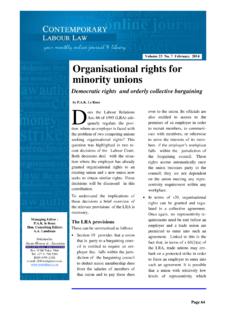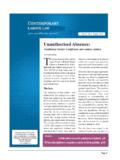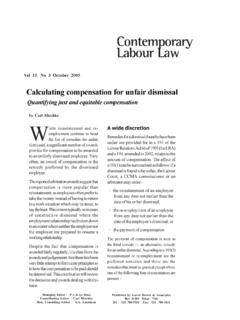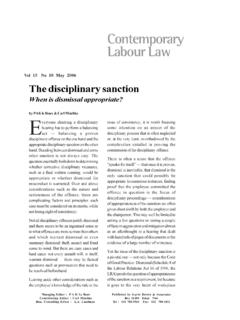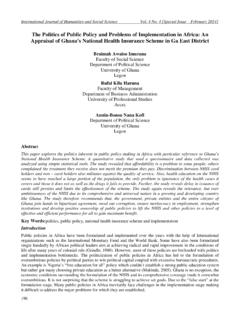Transcription of Contemporary Labour Law - Monthly Journal/ …
1 Managing Editor : P A K Le RouxContributing Editor : Carl MischkePublished by Gavin Brown & AssociatesBox 31380 Tokai 7966 Tel : 021 788-5560 Fax: 021 788-1811 Vol 16 No 7 february 2007 Hon. Consulting Editor : LandmanMany commentators have made thepoint that, given our history, it issurprising that the Labour Courthas had to consider so few disputes dealingwith allegations of unfair discrimination,especially disputes involving test cases where issues of principle are determined. Thelatest few editions of both the Industrial LawJournal and Butterworths Labour LawReports may contain indications that this ischanging. They contain several reporteddecisions in which the Labour Court has hadto consider allegations of unfair , with one possible exception, thesecannot be considered test cases thesedecisions are nevertheless of interest andthey will be discussed in this Pay:Co-operative Workers Association &another v Petroleum Oil and Gas Co-operative of SA & others [2007] 1 BLLR55 (LC)The decision in this case is of some interestbecause it is a decision on an issue that cropsup with some regularity.
2 The respondentemployer in this matter, Petro SA, had comeinto being as a result of the merger of threepreviously separate entities, each withdifferent terms and conditions ofemployment. Negotiations between theemployer and the recognised unions thentook place with the aim of standardisingterms and conditions of employment. Theapplicant union in this matter, the IndependentDemocratic Employees Association (IDEA)originally took part in these negotiations butlater withdrew from the process. Subsequentto this withdrawal the other unions and theemployer entered into a collective agreementin terms of which terms and conditions ofemployment were standardised. Thisagreement was also made binding on themembers of IDEA, presumably by virtueof the provisions of s 23(1)(d) of the LabourRelations Act, 66 of of merged entities, MOSGAS, hadhad a policy of subsidising the medical aidUnfair discrimination in the workplaceby Le RouxRecent decisions of the Labour CourtWho can join a protected strike?
3 P78 Deductions from Pension Fundbenefits: an update. LawPage 72 Contemporary Labour Law Vol 16 No 7 february 2007costs of employees. This was especially advantageousto employees with dependants such an employeereceived a subsidy of R per month in respectof himself or herself, plus a further amount of R month in respect of his or her spouse or adultdependant and per month in respect of eachdependant collective agreement made provision for theconcept of total guaranteed remuneration (TGR).Various allowances and benefits received byemployees, including the above medical aid benefit,were incorporated into the TGR. The result was thatthe TGR of employees who previously worked forMOSGAS and who had dependants, was higher thanthat of other employees doing the same argued that this constituted unfair discriminationand referred the matter to the Labour Court.
4 It basedits claim on two grounds, namely that employees hadbeen discriminated against on the basis of familyresponsibility (more accurately on the basis of a lackof family responsibility) and on the basis of healthstatus . The Court only considered the first responsibility is listed in s 6 of EmploymentEquity Act, 55 of 1998 (EEA) as a prohibited groundfor discrimination. It defines family responsibility as - .. the responsibility of employees inrelation to their spouse or partner theirdependent children or other members oftheir immediate family who need theircare or support .. The Court found that this definition was dispositive ofthe question as to who was protected in terms of thisprovision ie persons with family responsibilities wereprotected and not persons who did not have conclusion was supported by a reading of variousinternational human rights instruments which led to thefollowing statement - [50] In the context of this case, theresult is that special measures are appliedto workers with family responsibilities toadjust for the hardships of having suchresponsibilities.
5 Without affirmation oftheir special status, there can be noequality amongst the workforce.[51] Responsibility for addressing thespecial needs of workers with familyresponsibilities, is not for the State tobear alone. In this case, Petrol SA issharing this responsibility by providingadditional remuneration for employeeswith dependants. The basis for theadditional remuneration is not merelyendorsed, but encouraged by nationaland international law.[52] The second applicant s claim thatits members without dependants be paidthe same additional component of theirremuneration as their counterparts withdependants is premised on a formalconception of equality at best. Itscomplaint that the difference in theadditional components to the basicremuneration impairs the dignity of itsmembers because they aren t rewardedequally for work of equal value is notcorrect.
6 The basis of the differentiationis unrelated to the work employees door the quality of their performance. Noris not having family responsibilities adisadvantaging difference. The conversecan be true. The second respondent paysmore to employees with dependants, notas a reward for performance. Nor is itan accolade for special achievement. Itis a legal and moral response to thesocial needs of a vulnerable group ofemployees. Whether the employees haveor do not have dependants has no impacton their intrinsic value and dignity ashuman beings. Their remuneration, basedon the number of dependants they have,cannot impact on their dignity. Theimpact of the differentiation on thedignity of employees without familyresponsibilities is not dissimilar to theimpact of a municipality levying higherutility charges from property owners inareas that are predominantly White(Pretoria City Council v Walker 1998 (2)SA 363 (CC)12).
7 Page 73 Contemporary Labour Law Vol 16 No 7 february 2007 Sexual harassment:Piliso v Old Mutual Life Assurance CompanySA Ltd C32 2005 That an employer can be held vicariously liable foracts of sexual (or other) harassment committedby its employees has been accepted in decisions suchas Ntsabo v Real Security [2004] 1 BLLR 58 (LC),Media 24 Ltd & another v Grobler [2005] 7 BLLR649 (SCA) and SA Transport and Allied WorkersUnion obo Finca v Old Mutual Life AssuranceCo (SA) Ltd & another (2006) 8 BLLR 737 (LC).There are two potential grounds for such a first is s 60 of the EEA read with s 6 of this 6(3) of the EEA provides that harassmentconstitutes discrimination if the harassment is basedon one of the prohibited grounds set out in s 6(1), egrace, sex, religion etc. Section 60 provides that anemployer may be held liable for the actions of anemployee who commits an act of harassment.
8 Thesection reads as follows -"60. Liability of employers. (1) If it isalleged that an employee, while at work,contravened a provision of this Act, orengaged in any conduct that, if engagedin by that employee s employer, wouldconstitute a contravention of a provisionof this Act, the alleged conduct mustimmediately be brought to the attentionof the employer.(2) The employer must consult allrelevant parties and must take thenecessary steps to eliminate the allegedconduct and comply with the provisionsof this Act.(3) If the employer fails to take thenecessary steps referred to in subsection(2), and it is proved that the employeehas contravened the relevant provision,the employer must be deemed also tohave contravened that provision.(4) Despite subsection (3), an employeris not liable for the conduct of anemployee if that employer is able to provethat it did all that was reasonablypracticable to ensure that the employeewould not act in contravention of thisAct.
9 " The essence of s 60 is that an employer will be heldliable for the sexual harassment of an employee if theemployer knew of the actions of the employee and didnot take the necessary steps to prevent the conduct ofthe employee. It was on this basis that the employer inthe Ntsabo decision was held liable for acts of sexualharassment committed by one of its not a case dealing with harassment, a similarapproach was adopted in the Finca decision, wherethe employer was held vicariously liable for thediscriminatory act of an employee who madederogatory racist remarks in respect of a second basis for liability is that of our commonlaw principles of delict and vicarious liability. In theMedia 24 decision the Supreme Court of Appealstated that it is settled law that an employer owes acommon law duty of care to its employees. This dutyis not confined to protection against physical harm butalso extends to protection against psychological harmcaused, for example, by sexual harassment.
10 Theintentional or negligent failure to provide such protectioncan lead to liability and an employer can be held liablefor the acts of its employees in this regard. The Courtstated that - [68] It is clear in my opinion that thelegal convictions of the communityrequire an employer to take reasonablesteps to prevent sexual harassment of itsemployees in the workplace and to beobliged to compensate the victim for"..the legal convictions of the community require an employer to take reasonablesteps to prevent sexual harassment of its employees in the workplace and to beobliged to compensate the victim for harm caused thereby should it negligentlyfail to do so. Media 24 Ltd & another v Grobler 74 Contemporary Labour Law Vol 16 No 7 february 2007harm caused thereby should itnegligently fail to do so.
